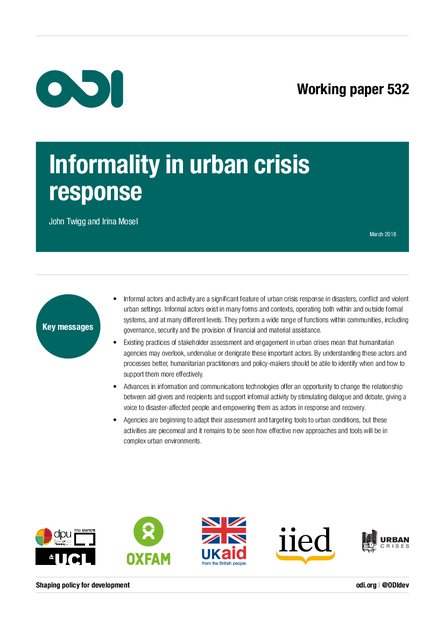
Informal actors and organisations often play a large role in crisis response in urban areas, but are often ill-integrated (if at all) into the humanitarian system. How can we change the relationship between aid givers and recipients to support informal activity, giving a voice to disaster-affected people and empowering them as actors in response and recovery?
This paper aims to highlight the role played by informal actors, and examine how existing stakeholder assessments and other tools used by humanitarian agencies can overlook, undervalue or denigrate these important actors. Advances in information and communications technologies offer an opportunity to change the relationship between aid givers and recipients and support informal activity by stimulating dialogue and debate, giving a voice to disaster-affected people and empowering them as actors in response and recovery.
The aim of this paper is to draw attention to the importance of informal actors, networks and activities in responding to urban crises, and to encourage humanitarian agencies and policy-makers to engage with informality more systematically. Ultimately, humanitarian and disaster management agencies need to invest more substantially in understanding the kinds of groups and organisations involved in disaster and crisis response, their composition, the different roles they play and how they could best work together.
This working paper is an output from the Urban Crises Learning Partnership (November 2015 to November 2017), a collaboration between Habitat for Humanity, Oxfam, the Overseas Development Institute and University College London. The partnership was part of the Urban Crises Learning Fund initiative managed by the International Institute for Environment and Development and funded by the UK Department for International Development.
Links
Resource collections
- Coordination
- UN Habitat - Urban Response Collection
- Urban Response - Urban Crisis Preparedness and Risk Reduction
- Urban Response Collection - Community Engagement and Social Cohesion
- Urban Response Collection - Economic Recovery
- Urban Response Collection - Environment and Climate Change
- Urban Response Collection - Housing, Land and Property
- Urban Response Collection - Urban Crisis Response, Recovery and Reconstruction
- Urban Response Collection - Urban Resilience